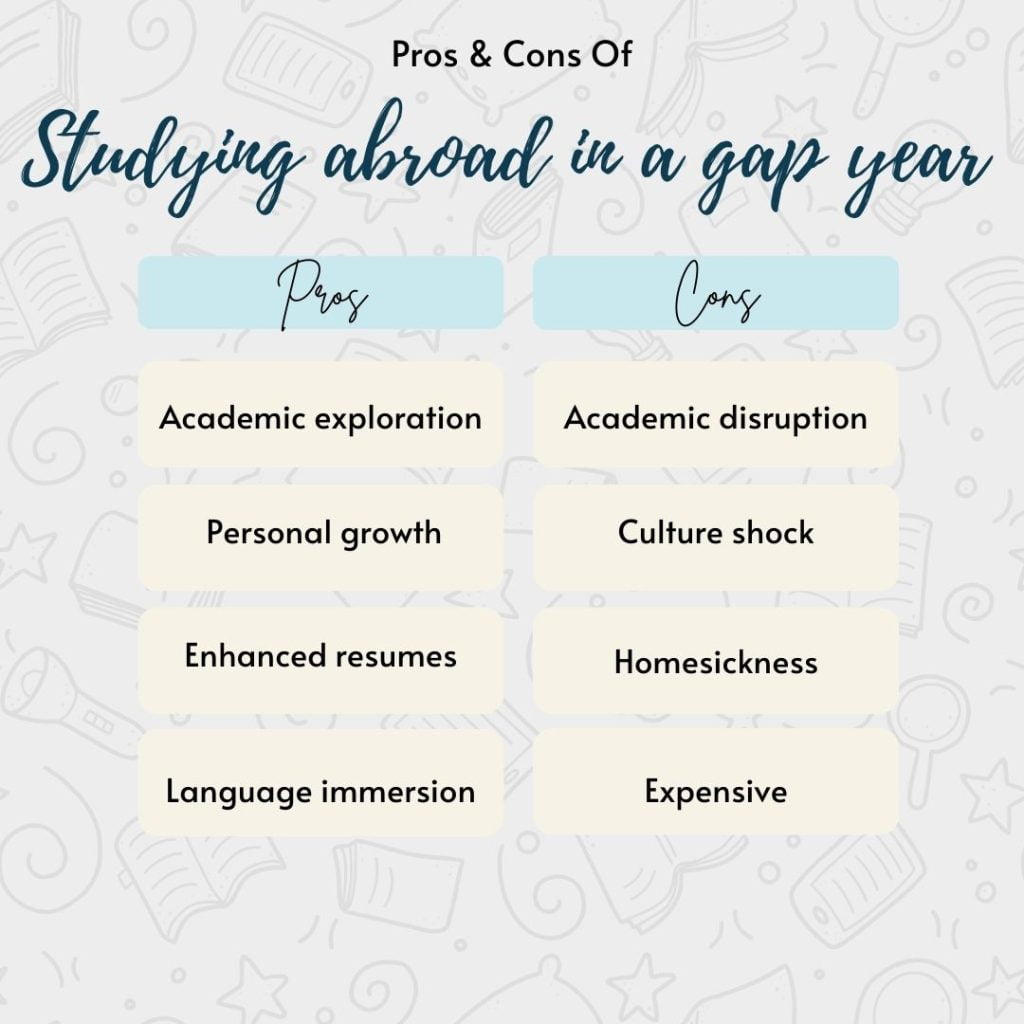Are you planning to drop one year and take a study abroad program in your gap year? Do you still need to figure out the credibility of this idea?
Deciding to study abroad is a great way to boost your resume with international experience. However, it’s important to consider all aspects of this decision.
Worry not! This blog thoroughly examines the pros and cons of studying in another country during your gap year, ensuring you have all the information you need.

Table of Contents
TogglePros
Academic exploration
Although a gap year is like a blot on the white canvas of your life, choosing to study abroad during that gap year will only add golden feathers to your cap.
You can study domain-specific subjects or delve into disciplines you could never have explored earlier. This immersive experience broadens your academic horizons and cultivates invaluable life skills. This can help you build a strong foundation for your future career prospects.
Personal growth
Imagine yourself in a new country, adapting to the new lifestyle, gaining independence, and learning the nitty-gritty of solo life. Growth through an adventure that sounds fun!
From mastering public transportation to savoring local cuisine, every experience becomes a lesson in self-sufficiency and personal growth. Embrace the thrill of exploration as you immerse yourself in unfamiliar customs and forge connections with fellow adventurers. Each challenge conquered is a triumph, fueling your journey toward self-discovery and empowerment.
Stepping out of your comfort zone is the ultimate way to grow personally and professionally.
Enhanced resumes
Studying abroad showcases your adaptability, cultural understanding, and passion for growth. Immerse yourself in diverse environments, honing language skills and expanding global perspectives. Gain invaluable experiences, navigating unfamiliar territories while fostering meaningful connections. Embrace challenges head-on, demonstrating resilience and openness to new ideas. Stand out from the crowd with a transformative journey that enriches your education and shapes you into a well-rounded individual poised for success in an interconnected world.
Networking opportunities
Studying abroad opens doors to a global network of diverse perspectives and valuable connections. Interacting with people from different cultures cultivates an inclusive worldview and fosters lifelong friendships. These international bonds form a strong support system, offering guidance, inspiration, and collaboration opportunities. Whether sharing academic insights, exploring career paths, or simply exchanging cultural traditions, your network becomes a rich horizon of experiences and resources.
Language immersion
Studying abroad is a gateway to bilingualism, offering immersive language learning experiences that go beyond textbooks. By living in a foreign country, you’re constantly exposed to the target language, allowing you to absorb new phrases, idioms, and collocations in a natural, native-like manner. Conversing with locals, attending classes, and navigating daily life in a different language accelerates your linguistic proficiency and cultural fluency.
Cons
Academic disruption
Stepping away from traditional education can set you back considerably compared to your peers. You might find adapting to a different academic system challenging, which could affect your grades or progress. Additionally, failing to keep up with your application process for studying abroad can result in missing out on meaningful opportunities. Recognizing these risks is crucial, as they could negatively impact your academic and professional future.
Culture shock
It’s important to realize that moving to a new country can bring about culture shock. This means you might face various challenges, like struggling to communicate due to language differences or feeling unsure about social customs you’re not used to. Awareness of these possibilities is vital because it helps you understand the difficulties you might encounter and prepare for them in advance.
Homesickness
Spending considerable time away from your loved ones during your gap year is inevitable. However, despite your efforts, be prepared to deal with feelings of loneliness. It’s crucial to devise effective communication strategies to stay connected despite the distance.
Program structure
Certain gap year programs have stricter rules and less flexibility than others. If you value having complete independence during your travels, it’s crucial to choose a program that aligns with your preferred style of exploration.
Expensive
Studying abroad can often cost an arm and a leg. Program fees skyrocket, leaving students drowning in debt before they even set foot in a foreign classroom. Travel expenses are an unavoidable burden and further strain already tight budgets. Living costs in foreign lands only fuel the fire, with inflated prices on accommodation, food, and daily necessities.

In conclusion, studying abroad during your gap year presents both incredible opportunities and potential challenges. On the one hand, it offers academic exploration, personal growth, enhanced resumes, networking opportunities, and language immersion. On the other hand, it may disrupt your traditional education, subject you to culture shock, homesickness, program structure constraints, and financial burden.
Study Unifees’ role
Study Unifees can provide invaluable guidance, helping you choose the right program that aligns with your goals, preferences, and financial situation. Our experts can assist you in navigating the complex application process, finding scholarships or financial aid, and preparing for the cultural and academic challenges you might face. By seeking our expert advice, you can maximize the benefits of your study abroad experience while minimizing potential drawbacks, ensuring a rewarding and enriching journey abroad. However, to navigate this decision wisely, it’s crucial to weigh the pros and cons carefully and consider consulting a study abroad agency.

